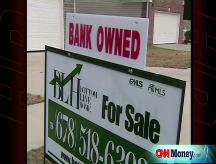Mortgage rates edge higher
Cost of 30-year fixed mortgages rise modestly, but remain sandwiched between concerns about inflation and recession.
NEW YORK (CNNMoney.com) -- Rates on 30-year fixed mortgages edged higher during the week ended Thursday, despite a recent dip in home sales for May.
Government-backed mortgage lender Freddie Mac (FRE, Fortune 500) said that 30-year fixed-rate mortgages averaged 6.37% with an average 0.6 point in the week ended Thursday, up from 6.35% last week. Last year at this time, the 30-year loan averaged 6.73%.
A report from the National Association of Realtors earlier in the week showed that mortgage applications dipped in May, "but April's increase was revised even higher," explained Freddie Mac chief economist Frank Nothaft in a statement.
Nothaft observed that the number of mortgage applications for the week ended July 4, just before the three-day U.S. holiday weekend, was almost 10% higher than the five-year low set two weeks prior, which he said helped temper the May decline.
Mortgage rates are in a bit of an uneasy equilibrium at the moment, which Mike Larson, real estate analyst with Weiss Research, described as a "tug of war between growth and inflation concerns, with a little bit of credit concerns sprinkled on top."
Other mortgage rates. The 15-year fixed rate mortgage this week averaged 5.91% with an average 0.6 point, down from last week when it averaged 5.92%. A year ago at this time, the 15-year fixed rate mortgage averaged 6.3%.
Five-year adjustable-rate mortgages (ARMs) averaged 5.82% this week, with an average 0.6 point, down from last week when it averaged 5.78%. A year ago, the 5-year ARM averaged 6.35%.
One-year ARMs averaged 5.17% this week with an average 0.5 point, unchanged from last week. At this time last year, the 1-year ARM averaged 5.71%.
A point, or "discount point," can be purchased at the time of closing to decrease the mortgage rate. Each point costs 1% of the loan amount and each point that a borrower purchases lowers the the loan interest rate.
It was a relatively stable place for mortgage rates to be, said Larson, and added that rates will probably stay about where they are until concerns about either recession or inflation win out. ![]()



